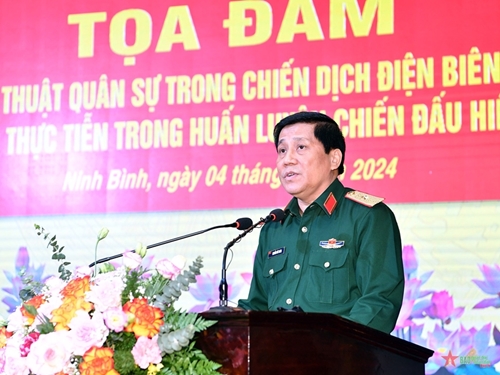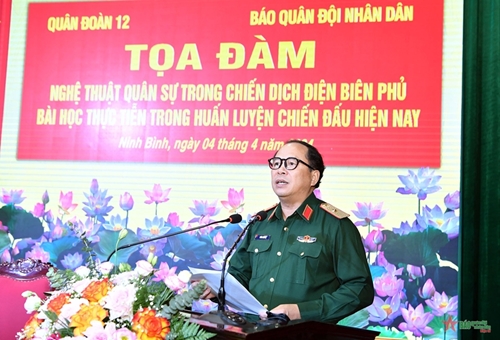    |
 |
|
Maj. Gen. Nguyen Duc Hung speaks at the event. |
Generals, leaders from the Ministry of National Defense’s affiliated agencies and units, military and civilian scientists, some historical witnesses directly engaging in the historic Dien Bien Phu Campaign participated in the event.
Delivering the opening remarks, Major General Nguyen Duc Hung, Political Commissar of Army Corps 12, confirmed that the seminar was one of the practical activities towards the 70th anniversary of the historic Dien Bien Phu Victory, affirming the stature, historical value, and cause of the victory. The event also made clear the military art in the Dien Bien Phu Campaign, stressing the wisdom and victory of the people's warfare and the whole people’s defense posture under the leadership of the Party and President Ho Chi Minh; lessons, creative and effective application of the lessons to training, exercises, logistics supplies and technical services, building of strong units, contributing to building elite, compact and strong units, a revolutionary, standardized, elite and modernized military.
In his speech, PAN Editor-in-Chief Major General Doan Xuan Bo stressed that the victory of the 1953-1954 Winter-Spring series of battles and campaigns with the Dien Bien Phu Campaign as a highlight dealt a decisive blow to shatter imperialists and colonialists’ evil invasion ambition, forcing the French government to sign the Geneva Accords in July 1954 on ending the war in Indochina, opening up a new page in the history of Vietnam’s revolution. The Dien Bien Phu Campaign was also an important event signaling the complete collapse of the old colonialism in the world.
    |
 |
|
Maj. Gen. Doan Xuan Bo speaks at the event. |
That victory came from the indomitable heroic tradition of our nation, the sound leadership of the Party and President Ho Chi Minh, the strength of the great national unity bloc, the heroic Vietnam People's Army's determination to fight and win and the spirit of weathering all difficulties, the strategic talent of generals in the Ho Chi Minh era, led by Commander-in-Chief General Vo Nguyen Giap, emphasized Maj. Gen. Bo.
As a military history expert, Dr., Maj. Gen. Nguyen Hoang Nhien, Director of the Institute of Military History, explained that with the all-people, comprehensive, long-term, self-reliant resistance war policy, the Party led the Vietnamese revolution to gradually surmount difficulties and challenges, winning a number of victories in Hoa Binh (1951-1952), Northwest (1952), Upper Laos (1953), and others, significantly changing the course of the resistance war against the French colonialists.
One of the important decisive factors to the Dien Bien Phu Victory was the shifting of the “fast combat, fast win” strategy to the “steady combat, steady advance” strategy. Regarding the changing in combat strategies, Dr., Maj. Gen. Tran Minh Tuan, Deputy Director of the Institute for Defense Strategy and Dr., Senior Colonel Vu Ngoc Thuy, Head of the Institute of Military Science and Art under the National Defense Academy, analyzed the situation and emphasized the strategic vision and sharp military thinking of General Vo Nguyen Giap in making that wise decision which was later unanimously approved by the Politburo. Under this strategy, adjustments in forces and combat posture were made. The enemy stronghold in Dien Bien Phu was isolated, the enemy’s reinforcement was cut, and the enemy fortifications were neutralized, resulting in the final victory on May 7, 1954. The two officials also pointed out the people’s warfare strategy, the art of using forces, the art of taking advantage of enemy’s weak points to combat, and especially the strategy of steady combat and steady advance.
Speeches delivered at the seminar also emphasized important lessons learnt from the Dien Bien Phu Campaign that should be effectively applied in the military-building cause.
Concluding the event, Maj. Gen. Nguyen Duc Hung appraised speeches. He underlined that the seminar gave an opportunity for participants to review the traditions and build trust and determination, highlighting the responsibility of officers and soldiers for the current task of Fatherland building and safeguarding.
Gen. Hung said that the seminar provided scientific arguments for the Party, State, Central Military Commission, and Ministry of National Defense to direct building and promoting the military's combat power and building a revolutionary, regular, elite, and modernized military to firmly safeguard the Fatherland in the new situation.
Translated by Mai Huong